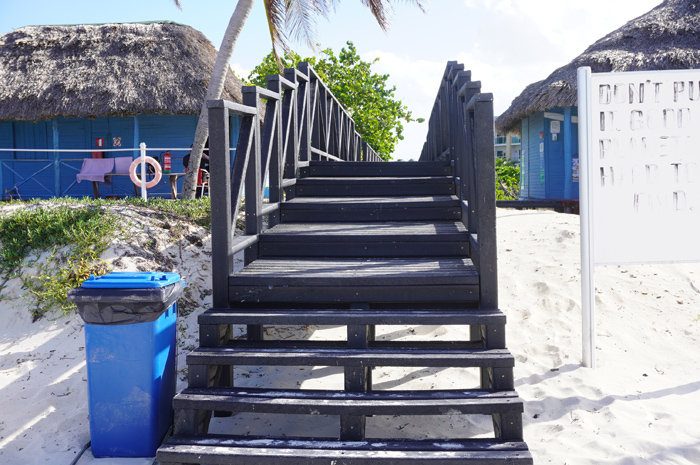In tune with the policies approved in the country for the proper management of plastic waste, the medium-sized company Restauraciones Riestra, from Sancti Spíritus province, incorporates into the architecture of hotel facilities in Jardines del Rey, elements made from the recovery of this ductile material.
Specialized in the execution and assembly of recovered plastic structures (beach access walkways, small boards, floors, pergolas, railings, docks, umbrellas, woven palapas and others), this entity has been working since the end of last year in the replacement of wooden pieces in poor condition in hotel facilities in the northern cay of Avila.
Jorge Felix Perez, architect and in charge of the budget management at Riestra Restorations, told the Cuban News Agency that they began their work at the Muthu Colonial Hotel, where they are replacing wooden components in the style that recreates the emblematic building, founded by Fidel Castro on November 12, 1993 and pioneer of tourist activities in the Avila sun and beach destination.
This is a highly complex task, since the modernization process seeks to respect the typical forms of the architecture of the period – to the extent possible and without trying to achieve the finish that is achieved in wood – in order to maintain the identity of the place, he explained.
They have provided services at the Sol Cayo Coco and Mojito hotels; and at present a brigade of 13 workers assembles the four access walkways to the beach at the Gran Marena Cayo Coco lodging, established at prudent heights so as not to affect the dynamics of the sands and vegetation in coastal areas, in compliance with the provisions of Decree-Law 77 “De Costas” (Coastal Decree-Law 77).
Previously, they have worked in other hotel establishments, extra-hotel establishments and camping sites in all regions of the country, due to the recognition they have acquired for the quality of the works and the advantages of plastic constructions, since they are more durable due to their capacity to resist environmental conditions, in addition to harmonizing with the other components of the environment.
Elvis Rodríguez Riestra, administrator of the medium-sized enterprise, explained that they focus on design and assembly tasks; they obtain the shaped structures -of different typologies and therefore used for different works- through linkages with other representations of the non-governmental sector (a non-agricultural cooperative and micro, small and medium-sized enterprises located in the provinces of Sancti Spíritus, Villa Clara and Matanzas).
These organizations obtain recycled plastics, with good quality, through companies that recover raw materials, then process them to make pieces according to the requests and supply them to entities such as Riestra Restorations.
Rodriguez pointed out that the waste resulting from the assembly process is recycled and commercialized with the suppliers, so that they maintain their use value and are reinserted in the economic-productive processes.
Specialists from the Territorial Delegation of the Ministry of Science, Technology and Environment recognized the correspondence of these practices with Resolution 96/2023 “Regulation for the work on sustainable consumption and production, Circular Economy (CE) and the gradual reduction of disposable or single-use plastics”.
Similarly, the implementation of these initiatives in the tourism sector is in line with the strategy defined in the Avilean domains for the transition to a CE, which conceives the so-called leisure industry as one of the priorities, taking into account the importance of this area for national economic progress.
In a global scenario of overexploitation of natural resources that compromise the availability for the development of numerous activities and the survival of the planet by exacerbating environmental problems, the models of sustainable consumption and production, based on the basic principles of CE, are proposed as a necessity and antithesis of the linear scheme (produce-consume and throw away).
The aim is to reduce pressure on the environment and improve air, soil and water quality.
In the economic sphere, opportunities are expanded due to the emergence of new business models and the development of other markets inside and outside the country, in addition to increasing the possibilities of achieving greater stability in the production of goods and services, with less waste and more material and energy self-sufficiency.
Circular companies achieve lower production and consumption costs, in addition to being more resilient because they are less exposed to the volatility of raw material prices, reduce the consumption of energy carriers and facilitate access to innovative, value-added and competitively priced products.
By implementing this model, the entities contribute to improving health and quality of life, thanks to the mitigation of environmental impacts and climate change, while generating employment and economic savings.




